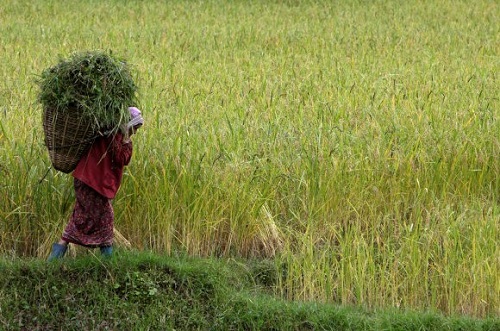Reuters photo
By
Jose Kalathil
NEW DELHI: India’s north-eastern state of Sikkim has been awarded the UN Food and Agriculture Organisation’s (FAO) Future Policy Gold Award, for setting an example to the world by becoming a totally organic state.
Presenting the award to Chief Minister Pawan Kumar Chamling, FAO Deputy Director Maria Helena Semedo said, “Sikkim is an outstanding example on how to successfully transform the food system and ensure respect for people and planet.” She also said that the award recognizes the state’s leadership and political will.
Sikkim beat 51 other nominees from around the world for the award. Brazil, Denmark and Quito, Ecuador, shared the Silver award.
Accepting the award at the FAO headquarters in Rome on October 15, Chamling said, “Let us build an organic world together.”
“An organic world is definitely achievable. I also appeal to the world community that we do not carry out any kid of development work and business at the cost of the environment.”
Nicknamed the “Oscar for best policies,” the award is co-organized with the FAO by The World Future Council (WFC) and IFOAM – Organics International, and recognizes “the world’s best laws and policies promoting agroecology.”
Sikkim’s transition to organic farming “has benefited over 66,000 family farmers, reaching beyond just organic production to include socioeconomic aspects such as consumption and market expansion, rural development and sustainable tourism with its comprehensive and inclusive approach,” the FAO official said.
At the ceremony, a film was shown highlighting how the state achieved the transformation through research, marketing and education for farmers.
Semedo said: “My message is a chemical-free world. If we want to protect the planet we have to go for chemical-free farming.”
The award recognizes the policies adopted by the state starting with a political commitment to support organic farming in 2003 that led to the 2010 Sikkim Organic Mission. The state’s policies and commitment led to it becoming the first 100 percent organic state.
Vandana Shiva, the environment activist and president of the Navdanya International, presented the silver award.
Earlier on October 15 at a news conference held at the Chamber of Deputies in the Italian Parliament, Chamling said that organic farming was a form of action of non-violence.
When his government embarked on the organic farming mission in 2003, it was confronted by opposition parties and vested interests of the chemical sector, but through hard work backed by a strong political commitment Sikkim was able to overcome the odds and become totally organic by 2015.
Now several Indian states such as Kerala and those in the northeast were trying to follow the example of Sikkim, he said.
It was important to involve the youth in the organic mission and many educated young farmers in the state have developed marketing strategies that take the state’s produces to places as far away as Delhi and Bengaluru, Chamling said.
Italy’s Agriculture Commission and Environment Committee leaders praised Sikkim’s achievement as a trendsetter for the world.
Italian parliamentarian Rossella Muroni, the Free and Equal Party leader on the Environment Committee, congratulated Chamling and Sikkim for their pioneering work and showing how organic farming is possible.
Maria Chiara Gadda, the Democratic Party leader at the Agriculture Commission, said that Sikkim was an inspiration for striving towards sustainable organic farming.
Jose Kalathil
Jose Kalathil is a senior journalist based in New Delhi. With more than three decades of experience in India and abroad, he is comfortable writing on any subject under the sun. He may be contacted at [email protected]



No Comments Yet!
You can be first to comment this post!